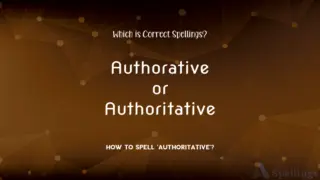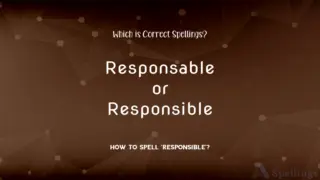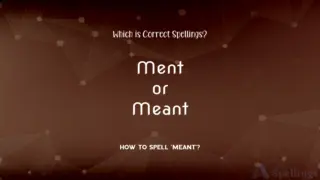Arguement or Argument: Which is Correct Spellings?
The incorrect spelling is "arguement," while the correct spelling is "argument." An "argument" is a reason or set of reasons given in support of an idea.
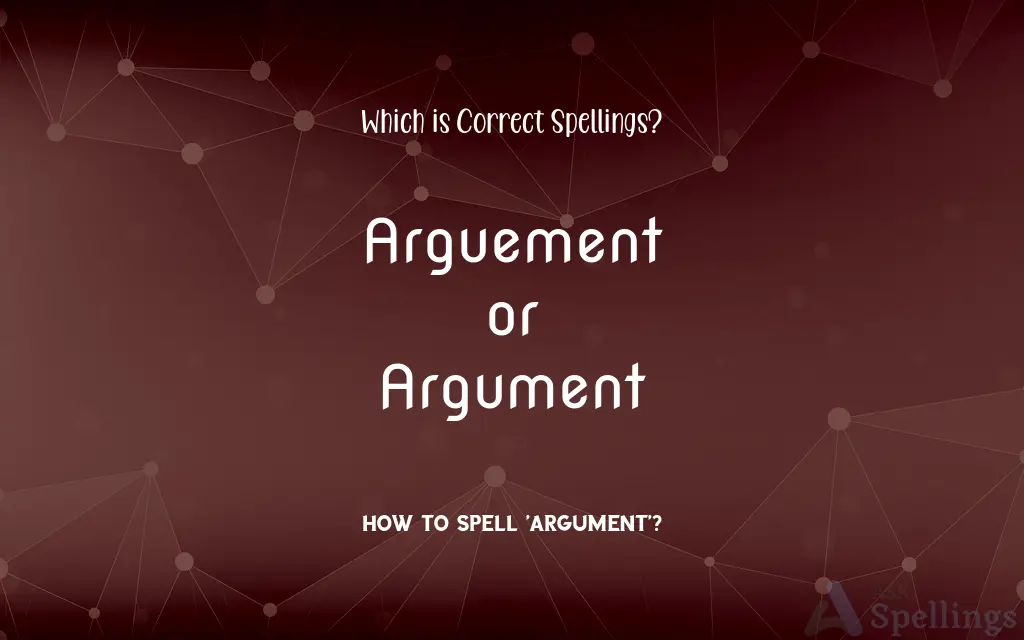
Which is correct: Arguement or Argument
How to spell Argument?

Arguement
Arguement Spelling

Argument
Argument Spelling
Table of Contents
Is it Arguement or Argument
Ment, Not MEnt: "Argument" ends with 'ment', not 'ment'.
Sound it Out: Pronounce it as "argu-ment," without an 'e' sound.
Visual Cue: Visualize the word as 'argu' followed by 'ment'.
No 'e' After 'u': Remember that "argument" does not have an 'e' after 'u'.
Associate with 'Argue': Link "argument" with 'argue' and add 'ment'.
How Do You Spell Argument Correctly?
Incorrect: Her arguement was based on solid facts.
Correct: Her argument was based on solid facts.
Incorrect: The arguement between the siblings lasted hours.
Correct: The argument between the siblings lasted hours.
Incorrect: Their arguement was about environmental policies.
Correct: Their argument was about environmental policies.
Incorrect: He presented a strong arguement in court.
Correct: He presented a strong argument in court.
Incorrect: The debate team prepared their arguement thoroughly.
Correct: The debate team prepared their argument thoroughly.
Argument Definitions
Dispute or Contention: A verbal dispute or contention.
The argument over the decision lasted for hours.
Point in a Discussion: A point or series of reasons presented.
Her argument in the essay was well-structured.
Logical Reasoning: The process of forming reasons, judgments, and inferences.
The scientist's argument was based on empirical evidence.
Reasoning to Persuade: A set of reasons used to persuade others.
His argument for the project was compelling.
Debate or Disagreement: Argument refers to a heated or angry disagreement.
The argument about the game rules was intense.
Argument Meaning in a Sentence
His argument in the debate was impressive.
The siblings had an argument over the television.
The argument started over a simple misunderstanding.
They had an argument about the best soccer player.
She put forward a strong argument for her theory.
The argument in her essay supported her thesis.
The class had an argument about historical events.
The argument about homework lasted all evening.
The argument in the meeting was about budget allocation.
Her argument was persuasive and well-reasoned.
She had an argument with her friend about the project.
Their argument was about who should clean the room.
The argument about the movie's ending was endless.
His argument against the plan was based on facts.
His argument for more recess time was convincing.
She found herself in an argument at lunch.
The team's argument was about the best strategy.
They had an argument about environmental conservation.
Her argument in the presentation was clear and logical.
The argument about the best book was lively.
The argument in the courtroom was tense.
Their argument about technology use was ongoing.
She presented her argument for the new club confidently.
The argument about math problems was challenging.
They got into an argument during the game.
The argument over the science project was resolved.
Their argument was loud and emotional.
He made an argument for going to bed early.
He had an argument with his brother about chores.
His argument for more outdoor play was supported by everyone.
Argument Idioms & Phrases
Winning argument
An argument or point that convincingly defeats opposing views.
Her presentation made a winning argument for increasing the research budget.
Compelling argument
An argument that is convincing and captures interest or agreement.
The environmentalist made a compelling argument for renewable energy sources.
Losing argument
An argument that fails to persuade or is defeated by stronger points.
Despite his efforts, he found himself on the losing side of the argument against the new policy.
Weak argument
An argument lacking in solid reasoning or evidence.
The opposition's claims were based on a weak argument that didn't convince the committee.
Endless argument
A prolonged argument that seems to have no resolution.
The committee's discussion turned into an endless argument with no clear outcome.
Logical argument
An argument that follows a clear and reasoned line of thought.
His logical argument was difficult to refute.
Strong argument
A well-supported and convincing argument.
The lawyer presented a strong argument in defense of her client.
Rational argument
An argument based on logic and reason.
She won the debate with a rational argument backed by facts.
Emotional argument
An argument based more on emotions than on logical reasoning.
His emotional argument appealed to the audience's sympathies.
Philosophical argument
An argument based on philosophical reasoning or concepts.
His thesis presented a complex philosophical argument on the nature of freedom.
Argument in favor
An argument supporting a particular idea, proposal, or course of action.
She put forward an argument in favor of adopting more sustainable practices.
Baseless argument
An argument lacking proper foundation or evidence.
Critics dismissed his claims as a baseless argument with no factual support.
Argument for inclusion
A rationale or reasoning advocating for incorporating or considering all relevant parties or ideas.
The committee made a strong argument for the inclusion of minority groups in the decision-making process.
Final argument
The last point or statement made in a discussion or debate.
His final argument summarized all the reasons the project should be approved.
Circular argument
An argument that ends where it begins, without making any progress.
The discussion turned into a circular argument, with no new points being made.
Argument against tradition
A reasoning or rationale opposing established customs or beliefs.
The article offered a persuasive argument against tradition, advocating for modern practices.
Sustained argument
An argument that is consistently maintained or upheld over a period.
Throughout the trial, the prosecution maintained a sustained argument against the defendant.
Heated argument
An argument characterized by intense emotion and often anger.
The debate quickly escalated into a heated argument.
Argument for change
A reasoning or rationale advocating for alteration or modification.
Activists presented a strong argument for change in environmental policies.
The heart of the argument
The central or most important point in an argument.
The heart of the argument centered on issues of economic inequality.
Common Curiosities
What is a stressed syllable in argument?
The stressed syllable in argument is the first syllable: ar-.
What is the pronunciation of argument?
Argument is pronounced as /ˈɑːrɡjʊmənt/.
How many syllables are in argument?
Argument has three syllables.
Is argument a noun or adjective?
Argument is a noun.
Is argument a countable noun?
Argument is a countable noun.
How do we divide argument into syllables?
Argument is divided into syllables as ar-gu-ment.
What is the verb form of argument?
Argument does not have a verb form as it is a noun.
Which vowel is used before argument?
There is no specific vowel rule for the word preceding argument; it depends on the context.
Is argument a vowel or consonant?
Argument is neither a vowel nor a consonant; it is a word composed of both.
Is argument an abstract noun?
Argument is considered an abstract noun.
Is argument a negative or positive word?
Argument is neutral; it can be used in both positive and negative contexts.
Is the argument term a metaphor?
Argument can be used metaphorically in certain contexts.
Is the word argument Gerund?
No, argument is not a gerund.
What part of speech is argument?
Argument is a noun.
What is the root word of argument?
The root word of argument is "argue."
Is argument an adverb?
No, argument is not an adverb.
What is the opposite of argument?
The opposite of argument could be "agreement" or "consensus."
What is the singular form of argument?
The singular form is argument.
What is the plural form of argument?
The plural form is arguments.
Is argument a collective noun?
No, argument is not a collective noun.
What is the first form of argument?
Argument is a noun and does not have verb forms.
What is the second form of argument?
As a noun, argument does not have a second form.
How is argument used in a sentence?
Example: "They had an argument about the best course of action."
Is the word “argument” a Direct object or an Indirect object?
Argument can function as either a direct object or an indirect object depending on the sentence structure.
What is another term for argument?
Another term for argument could be "debate" or "dispute."
What is the third form of argument?
Argument, being a noun, does not have a third form.
Which conjunction is used with argument?
Conjunctions like "and" or "but" can be used with argument, depending on the sentence structure.
Is the word argument imperative?
No, argument is not imperative; it is a noun.
Why is it called argument?
It is called argument to describe a discussion or disagreement, often involving differing points of view.
Which determiner is used with argument?
Determiners like "an," "the," or "a" can be used with argument, depending on the context.
Which preposition is used with argument?
Prepositions like "about," "over," or "against" can be used with argument, e.g., "argument about a topic."
Which article is used with argument?
Articles like "a," "an," or "the" can be used with argument, depending on the context.
Share Your Discovery
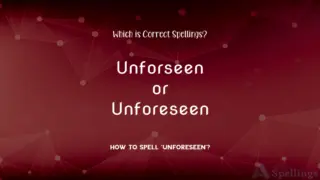
Previous Spelling
Unforseen or Unforeseen
Next Spelling
Truely or Truly




